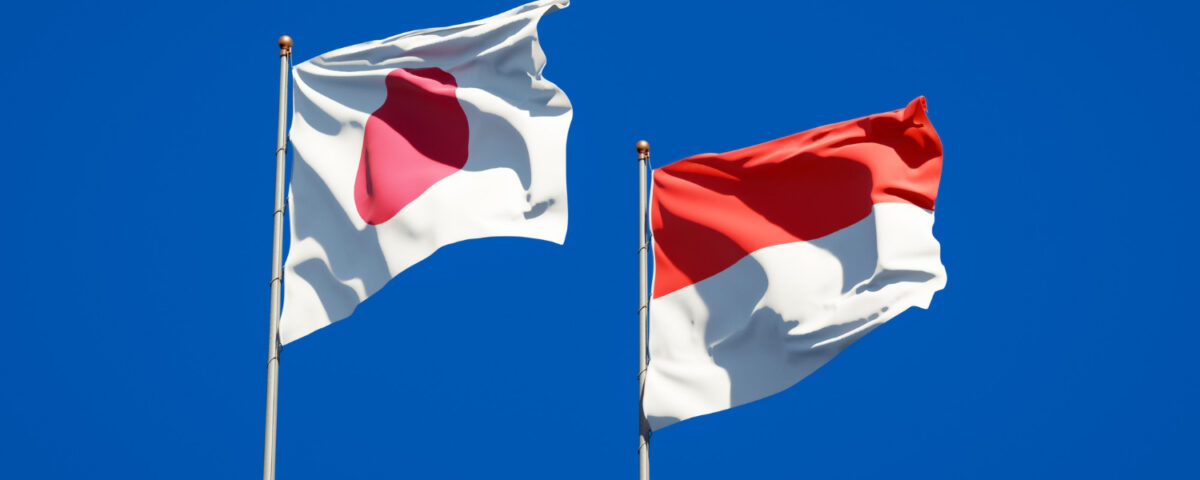
Getting Closer Relationship: Indonesia VP Visit Japan | Sept 2022
October 5, 2022
Japan Indonesia Industrial Business Relationship
October 15, 2022Why Japan Is Investing so much in Indonesia
Japan is one of the world’s leading investors in Indonesia. In 2018, Japanese companies invested a record $18.4 billion in the country. That’s more than double the amount invested in 2017, and it represents a significant increase from the $5.6 billion invested in 2010.
There are a number of reasons behind Japan’s investment in Indonesia. For one, the country is rich in natural resources like oil, gas, and minerals. Indonesia is also the world’s fourth most populous country, with a burgeoning middle class that offers a large potential market for Japanese goods and services. In addition, Japan sees Indonesia as a key partner in its “Free and Open Indo-Pacific” strategy. This strategy is designed to promote peace and prosperity in the Indo-Pacific region by ensuring freedom of navigation and overflight, upholding international law, and expanding economic cooperation.
Indonesia is an important part of Japan’s Indo-Pacific strategy, and Japanese investment in the country will likely continue to grow in the years to come. Tensai Karawang: Learning Indonesian for Japanese.
The Historical Relationship Between Japan and Indonesia
The two countries have a long and complicated history. Japan colonized Indonesia during World War II, which led to years of resentment and struggle for independence. Since then, the relationship has been characterized by both cooperation and competition.
Japan is now one of Indonesia’s main development partners, investing in infrastructure, manufacturing, and other sectors. The two countries are also working together to address regional challenges such as maritime security and terrorism.
Japan’s Presence in Indonesia
Over the past few years, Japan has been investing heavily in Indonesia. This is due to a number of factors, including Indonesia’s large population and young workforce, its growing economy, and its strategic location in Southeast Asia.
Japan is Indonesia’s second-largest investor, with investments totaling $30 billion in 2017. Japanese companies have a presence in a variety of sectors in Indonesia, including automotive, electronics, chemical manufacturing, and infrastructure.
Japanese investment has been instrumental in supporting Indonesia’s economic growth. For example, Toyota Motors has built a factory in Jakarta that produces vehicles for the Indonesian market. This has created jobs and helped to develop the local automotive industry.
Japanese investment has also contributed to the development of Indonesia’s infrastructure. In 2016, Japan provided $1.6 billion in loans to build a new railway line between Jakarta and Bandung. This project will help to improve connectivity within Indonesia and boost economic activity.
Overall, Japan’s presence in Indonesia is having a positive impact on the country’s economy and society. The government is supportive of Japanese investment, and it is hoped that this close relationship will continue to grow in the future.
The Japan-Indonesia History
The Japan-Indonesia relationship is one of the oldest and most important bilateral relationships in Asia. The two countries have a shared history that dates back centuries, and their modern day partnership is built on a foundation of mutual respect and cooperation.
Japan has been a major investor in Indonesia since the country’s independence in 1945, and today, Japanese companies are actively involved in various aspects of the Indonesian economy, including infrastructure development, manufacturing, finance, and agriculture. In recent years, Japan has also become an increasingly important source of development assistance for Indonesia.
The close economic ties between Japan and Indonesia have benefited both countries enormously. For Japan, Indonesia is an important market for its exports and a key source of raw materials and energy. For Indonesia, Japanese investment has been instrumental in supporting economic growth and development.
The strong economic partnership between Japan and Indonesia has been accompanied by close political and security ties. The two countries cooperate closely on regional issues such as maritime security and disaster relief, and they are also strategic partners in the Asian region more broadly.
The deepened economic partnership between Japan and Indonesia over the past few years has been underpinned by a series of high-level visits between the two countries’ leaders. In 2013, Prime Minister Abe Shinzo made an official visit to Indonesia, during which he met with President Susilo Bambang Yudhoyono to discuss ways to further deepen the bilateral relationship. During President Yudhoyono’s state visit to Japan in 2014, the two countries signed a number of agreements, including a memorandum of understanding on defense cooperation.
The strong and growing partnership between Japan and Indonesia is based on shared values and interests, and it is an important part of both countries’ foreign policy agendas.
Indonesian Investment Boom
Indonesia is currently experiencing an investment boom, with Japanese businesses leading the way. There are a number of reasons for this increased interest in investing in Indonesia, including:
-The country’s large and young population
-A growing middle class with increasing disposable income
-Improved economic stability and growth prospects
-A favorable business environment
Japanese businesses are well positioned to take advantage of these opportunities and are investing heavily in Indonesia. In particular, there has been a recent surge in Japanese investment in the country’s infrastructure, manufacturing, and retail sectors. This is likely to continue as Indonesia continues to grow and develop, providing significant opportunities for Japanese businesses.
Why Japan is Investing in Indonesia
Japan is investing in Indonesia because it offers a number of advantages as an investment destination. First, Indonesia has a large population with a growing middle class. This provides a large potential market for Japanese companies. Second, Indonesia is located in a strategically important position in Southeast Asia. It is a member of the Association of Southeast Asian Nations (ASEAN) and is also close to Japan. This makes it an ideal location for Japanese companies to serve the Southeast Asian market. Third, Indonesia has abundant natural resources, including oil and gas, which are important to Japan’s energy security. Finally, the Indonesian government has been working to improve the business environment and attract foreign investment. This includes reforming the investment law and streamlining the investment approval process. As a result, Japan is one of the largest investors in Indonesia.
The Current Economic Relationship Between the Two Countries
Indonesia is currently the world’s 16th largest economy, while Japan is the world’s 3rd largest. In terms of purchasing power parity, Indonesia’s economy is the 8th largest in Asia and 7th in the world, while Japan’s is 2nd in Asia and 3rd in the world. The two countries have had a strong economic relationship for many years, with Japan being one of Indonesia’s main trading partners and sources of investment.
In recent years, however, there has been a shift in the economic relationship between the two countries. While Japan used to be Indonesia’s biggest investor, it has now been overtaken by China. In 2017, Japanese investment in Indonesia totaled US$6.4 billion, while Chinese investment was nearly double that at US$12.2 billion.
There are several reasons for this shift. One is that Indonesia’s economy has been growing rapidly in recent years, while Japan’s has been stagnant. This has made Indonesia a more attractive destination for investors looking for high returns. Another reason is that the Indonesian government has been pursuing an ambitious program of infrastructure development, which has required a large amount of investment from both domestic and foreign sources. Japanese companies have been involved in some of these projects, but not to the same extent as Chinese companies.
Despite this shift in the economic relationship between the two countries, Japan remains an important partner for Indonesia. Japanese investment is still vital for the Indonesian economy, and the two countries continue to cooperate closely on a range of economic and trade issues.
Investment Giant
Japan is one of the world’s largest investors in Indonesia, with Japanese companies investing a total of US$30.4 billion in the country between January 2005 and September 2015. This figure represents around 15% of all foreign direct investment (FDI) in Indonesia during that period.
There are a number of reasons why Japan is such a big investor in Indonesia. Firstly, Indonesia is a large and growing market for Japanese goods and services, with a population of over 250 million people and an annual GDP growth rate of around 5%. Secondly, Indonesia is rich in natural resources, including oil, gas, coal, timber, and minerals, which are all important inputs for the Japanese economy. Finally, the two countries have strong economic and trade ties, with Japan being Indonesia’s second-largest trading partner after China.
So why is Japan investing so much in Indonesia? The answer lies in the country’s large market size, rich natural resources, and strong economic ties.
The Fall of Japan?
Japan is the world’s third largest economy, and it has been a major player in the global economy for decades. However, its economic growth has slowed in recent years, and some analysts are predicting that Japan could soon be overtaken by China as the world’s second largest economy.
There are a number of factors behind Japan’s economic slowdown, including a shrinking workforce, rising debt levels, and persistent deflation. But one of the most important factors is the country’s increasing reliance on imports.
In 2013, Japan imported a record $837 billion worth of goods, while its exports totaled just $768 billion. This trade deficit is unsustainable in the long run, and it is one of the main reasons why some analysts are forecasting an imminent economic decline for Japan.
If Japan does indeed fall into economic decline, it would have far-reaching implications for the global economy. For one thing, Japanese companies are among the biggest investors in Indonesia, and a slowdown in Japanese investment would likely lead to a slowdown in Indonesian economic growth.
Additionally, a weaker Japanese yen would make Chinese exports more competitive, further threatening Japanese businesses. And finally, a weakening Japanese economy would likely lead to further declines in global stock markets and commodity prices.
Masayoshi Son
Masayoshi Son, chairman and CEO of Japanese multinational conglomerate SoftBank Group, is one of the most powerful figures in the tech industry. He’s also one of the most influential investors in Indonesia.
Son’s interest in Indonesia began in 2011, when he met with then-President Susilo Bambang Yudhoyono. Since then, he has been a frequent visitor to the country and has made several high-profile investments.
In 2015, Son committed to investing $10 billion in Indonesia over the next few years. He has since followed through on that promise, with major investments in ride-hailing app Go-Jek and e-commerce platform Tokopedia.
These investments are part of Son’s larger vision for Indonesia. He sees the country as a key market for technology and believes that it has tremendous potential for growth.
Son’s commitment to investing in Indonesia is a boon for the country’s economy. His investment will help fund infrastructure projects and spur job creation. In addition, his presence will attract other foreign investors to Indonesia.
The Downsides
Indonesia is a huge market for Japanese companies, and Japanese investment in Indonesia has grown rapidly in recent years. However, there are some downsides to investing in Indonesia that Japanese companies should be aware of.
What the Future Holds for the Relationship Between Japan and Indonesia
The future looks bright for the relationship between Japan and Indonesia. Both countries have strong economic ties and are committed to furthering their cooperation. In recent years, Japan has been investing heavily in Indonesia, including in infrastructure projects. This is in line with the Indonesian government’s goal of developing the country and making it a more attractive destination for foreign investment.
Indonesia is a key market for Japanese companies, and this is unlikely to change in the future. There are many opportunities for businesses from both countries to work together, and the relationship between the two governments is strong. Japan is also one of Indonesia’s main development partners, and this is likely to continue. The two countries have a shared interest in promoting peace and stability in the region, and cooperating on issues such as maritime security.
Tensai Nihongo Bunka Gakuin Provides Indonesian Courses for Japanese Who work in Karawang Industrial Areas
The Tensai Nihongo Bunka Gakuin provides Indonesian courses for Japanese who work in Karawang industrial areas. The school offers a comprehensive curriculum that covers all aspects of the language, from grammar and vocabulary to reading and writing. The course is designed to help students master the Indonesian language so they can effectively communicate with their colleagues and customers in the workplace.
Tensai Nihongo Bunka Gakuin is located in Karawang, a city in the province of West Java, Indonesia. The school was established in 2011 and offers a variety of courses for Japanese students, including Indonesian language courses, business courses, and cultural exchange programs.
Benefits of Indonesian Course for Japanese
The Indonesian course for Japanese is designed to help students learn and improve their Indonesian language skills. The course offers a variety of benefits that can help students in their studies, careers, and everyday life.Some of the benefits of the Indonesian course for Japanese include:
-Improved communication skills: The course can help students improve their ability to communicate with others in both written and spoken Indonesian.
-Cultural understanding: The course can also help students gain a better understanding of Indonesian culture and traditions.
-Enhanced employment prospects: Those who complete the course will have an advantage when seeking employment in Indonesia or other countries where Indonesian is spoken.
Conclusion
It’s evident that Japan sees a lot of potential in Indonesia, and is investing heavily in the country. There are many reasons for this, including Indonesia’s large population and strategic location. With so much potential, it’s no wonder that Japan is betting big on Indonesia’s future.

